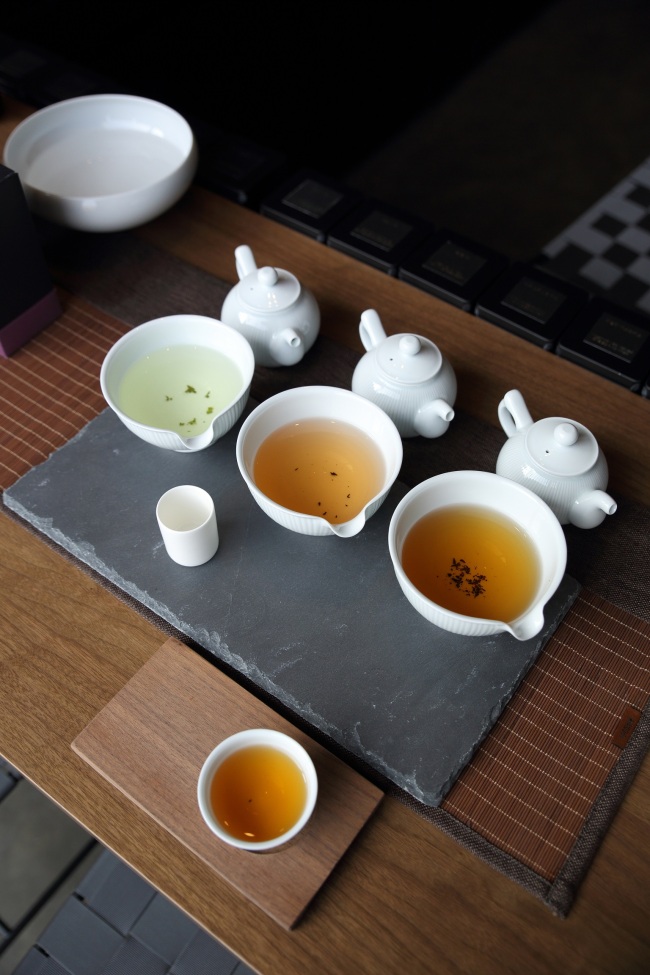In South Korea, home to some of the world’s most avid coffee consumers, tea has often been pushed aside as a traditional drink befitting the older generation and out of touch with modernity.
However, with more Koreans prioritizing health and demanding wider beverage options, tea is gradually emerging as an attractive drink, fueling the country’s fledgling tea industry.
Korean tea makers are capitalizing on the natural and clean image of tea to expand their market share in the country’s beverage segment including promoting tea as a healthier and more upscale beverage over coffee as well as reinterpretating tea as a modern drink for the young generation.
Take for instance, O’sulloc, a tea brand most familiar to Koreans with a specialty in upscale green tea. Operated by Korean cosmetics giant AmorePacific, O’sulloc said it mainly targets women in their mid-20s and 30s who are interested in the therapeutic effects of tea and willing to try new drinks.
It operates 22 teahouses and sells green tea products at 53 department stores, positioning itself as a “premium” maker of green tea and offering consumers exclusive opportunities to experience a relaxing and upscale tea culture in the city, an O’sulloc representative said.
O’sulloc’s biggest selling point is Jejudo Island, where it runs an organic green tea farm and a museum dedicated to green tea — both of which have helped elevate AmorePacific and its tea affiliate as a green, eco-friendly brand in tune with nature and relaxation.
However, O’sulloc’s sales have largely stayed stagnant, even falling in recent years as traditional tea remains out of touch with the larger population, according to the company. It declined to provide exact numbers, citing regulatory compliance.
“The Korean tea market is still nascent, said the O’sulloc official. “Though most people have limited knowledge about tea, interest in tea is growing among the health conscious public,” he said.
“Our short term plan is to sell more tea-based drinks to foremost expand general tea consumption. In the long run, we will gradually shift gears to selling pure tea.”
Meanwhile, Korean blended tea franchise Ogada is working to convince consumers that “traditional tea is not only healthy but also tasty.” Founded in 2009, the brand operates 131 stores locally, targeting consumers of all ages with the aim of encouraging general tea consumption.
To break stereotypes about tea, which is often seen as healthy yet bland, Ogada’s tea blends incorporate herbs, fruits and local ingredients to create modern tastes based on traditional Korean tea
Ogada, an unlisted company, says it has been recording stellar sales growth of around 30 percent annually, according to company spokesperson Lee Jae-chang. Riding on the expected tea boom here, it aims to record 10 billion won ($8.82 million) in sales by 2020.
Taking tea to a new level is Taiwanese milk tea franchise Gong Cha Korea, which is now operated by Japanese private equity fund Unison Capital.
Though some refuse to recognize Gong Cha’s drinks at “real tea,” the brand nonetheless considers itself successful in reinterpreting tea for a younger audience.
Known for its signature customizable “bubble tea” — freshly-made milk tea varieties accompanied by tapioca pearls — Gong Cha Korea’s sales doubled from 27.9 billion won in 2013 to 54 billion in 2014, with net income doubling to 9.4 billion won during the same period.
“We were able to break the idea that tea is an old, traditional beverage and contribute to instilling a diversified and fun tea drinking culture in Korea,” said Gong Cha Korea spokesperson Hyun Ye-seul.
Despite posting some 59.7 billion won in sales last year, the firm saw a 40 percent cut in net income on-year to 5.7 billion won in 2015, raising alarm over the waning popularity of its products.
Gong Cha Korea thinks otherwise, Hyun said, calling the profit drop a temporary phase linked to investment toward extending its workforce. In fact, it plans to open at least 100 new stores — adding to its existing 376 outlets — and post a two-digit growth in sales this year. It is also in talks over potentially acquiring its global headquarters Royal Tea Taiwan Co.
Reflective of rising demand for tea and non-coffee drinks, franchise coffee brands are also offering a wider variety of tea at their outlets.
Starbucks Coffee Korea currently offers some 20 types of tea and milk tea, with sales of tea-based drinks rising every year, according to company spokesperson Park Han-jo. “Though coffee remains our dominant product, tea is a steady seller.”
Though there are still few outlets, a number of European-style tea franchises have also begun to emerge, including Germany’s Rogenfeldt and homegrown brand Chloris Tea & Coffee, among others.
Industry officials say the tea industry is likely to grow into a solid market in the future. “Steeped in tradition, tea is not simply a passing trend … given its potential to tie into other industries, the tea (business) is a sustainable one,” said Lee.
By Sohn Ji-young ([email protected])


